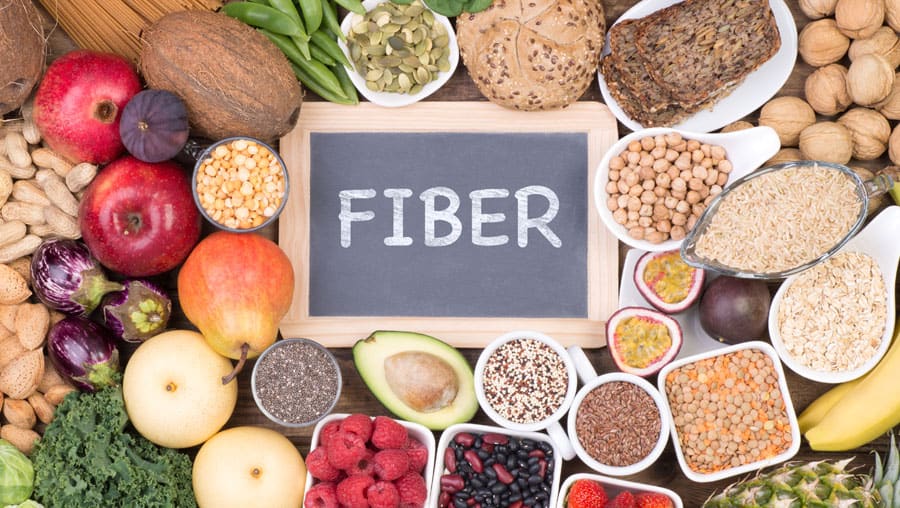What if there was one magic pill that could boost your metabolism, increase your lifespan, help you feel full, clear up your complexion, control your cholesterol, and reduce your risk for cancer, diabetes, and heart disease? OK, there’s not a pill, but there is a single ingredient: fiber.
“Always focus on eating more fiber”. You’ve probably heard this more times than you can recall. So we automatically assume that it must be really good for us. The only problem is that fiber and flavor are exactly like opposites.
And for most of us, the flavor is the foundation in terms of food choice. However, the reality is that it can have flavor too, along with great medicinal effects that you may not even know about.
Effects like potentially help to reduce and prevent common diseases.
What Is Fiber?
It is a plant-based and essential nutrient. It is a kind of carbohydrate but, unlike other carbs, it cannot be broken down into digestible sugar molecules. Therefore, it passes through the intestinal tract relatively intact. However, on its journey, it does a lot of work.
The term “fiber” refers to the indigestible parts of plant-based foods. In other contexts, it might refer to plant-based cloth, but when speaking of nutrition, the terms “fiber” and “dietary fiber” are often interchangeable.
Some fibers are soluble in water and others are insoluble. Soluble fiber slows digestion and helps you absorb nutrients from food. Insoluble fiber adds bulk to your stool, helping the stool pass more quickly through the intestines.
Fiber is mostly in vegetables, fruits, whole grains, and legumes. There are two types of fiber — soluble and insoluble — and both play important roles in health:
- Insoluble does not dissolve in water and adds bulk to the stool, preventing constipation.
- Soluble absorbs water, forming a gel-like substance in the digestive system. Soluble fiber may help lower cholesterol levels and help regulate blood sugar levels.
Nutritional Importance Of Fiber
Fiber is a type of carbohydrate that is found in plant-based foods such as fruits, vegetables, grains, and legumes. It is an important part of a healthy diet and has a variety of health benefits.
One of the main benefits of fiber is its ability to promote regular bowel movements and prevent constipation. Fiber adds bulk to the stool, which helps to move food through the digestive system more efficiently. It also absorbs water, which helps to keep the stool soft and easier to pass.
In addition to its digestive benefits, fiber has also been shown to have a number of other health benefits. It has been linked to a reduced risk of heart disease, type 2 diabetes, and certain types of cancer. Fiber can also help to lower cholesterol levels and regulate blood sugar levels, making it an important nutrient for people with diabetes or high cholesterol.
Types
Some fibers are soluble in water and others are insoluble. Soluble fiber slows digestion and helps you absorb nutrients from food. Insoluble fiber adds bulk to your stool, helping the stool pass more quickly through the intestines.
Most plant foods contain some of each kind of it. Foods with high levels of soluble fiber include dried beans, oats, oat bran, rice bran, barley, citrus fruits, apples, strawberries, peas, and potatoes.
Foods high in insoluble fiber include wheat bran, whole grains, cereals, seeds, and the skins of many fruits and vegetables.
-
Insoluble Fiber
It is the type of fiber that repels water. You can find it in foods such as veggies, fruits, nuts and seeds, wheat bran, and whole-grain foods like whole-wheat pasta and brown rice. Its primary benefit is to provide bulk to stool and aid in the movement through the digestive tract.
Insoluble fiber, on the other hand, speeds up the passage of food through the digestive system. This helps maintain regularity and prevent constipation. It also increases fecal bulk, which makes stools easier to pass.
Good sources include:
- Fruits
- Nuts
- Vegetables
- Whole-grain foods
-
Soluble Fiber
Soluble fiber is a type of fiber that attracts water and forms a gel. This gel causes a slowing of the digestion process, which can be beneficial for weight loss. Foods high in soluble ones include oats, legumes, edible plant skins, and nuts.
Both soluble and insoluble fibers have important benefits. It is known to help decrease blood glucose (blood sugar) levels. It also helps lower blood cholesterol.
Good sources include:
- Beans
- Fruits
- Oats
- Nuts
- Vegetables
Benefits Of Fiber
- Digestion: This is, by all means, the best-known benefit. Bulkier, softer stools are easier to pass than hard or watery ones, which not only makes life more comfortable but also helps maintain colorectal health.
- Heart Health: It also helps lower cholesterol. The digestive process requires bile acids, which are made partly with cholesterol. As your digestion improves, the liver pulls cholesterol from the blood to create more bile acid, thereby reducing the amount of LDL (bad) cholesterol.
- Blood Sugar: Increased intake can reduce blood glucose levels during the standard fasting blood glucose test (a test of blood sugar levels after an overnight fast).
-
Weight Loss: Normal-weight and overweight people have been found to have a higher intake than obese individuals. Other studies continue to suggest that high-fiber intakes help reduce weight gain as you age.
Best Food Sources Of Fiber
Nuts And Seeds
- Chia Seeds
- Sunflower Seeds
- Almonds
- Peanuts
Grains
- Bran
- Barley
Vegetables
- Sweet Potatoes
- Brussel Sprouts
- Corns
- Artichokes
Fruits
- Apple
- Raspberries
- Pears
- Avocados
- Blackberries
Grains
- Split Peas
- Lima Beans
- Lentils
- Black Beans
- Chickpeas
Extras
- Prunes
- Seaweed
- Whole Wheat Pasta
High Fiber Foods For Weight Loss
Fruits
- Avocados
- Apple
- Blackberries
- Raspberries
Vegetables
- Corn
- French Green Beans
- Artichokes
- Brocolli
Nuts And Seeds
- Nuts
- Chia Seeds
- Flax Seeds
Grains
- Lentils
- Chickpeas
Tips For Increasing Intake
People can boost their daily intake by making a variety of small changes:
- Having fruits and vegetables with the skins on.
- Consuming beans or lentils for salads, soups, and side dishes.
- Replacing white slices of bread and pasta with whole-wheat versions.
- Aiming to eat 4.5 cups of vegetables and 4.5 cups of fruit each day.
What Happens When You Consume Too Much?
Fiber is a type of carbohydrate that is found in plant-based foods such as vegetables, fruits, beans, legumes, and whole grains. It is an important component of a healthy diet and has numerous benefits, including improving digestive health, lowering cholesterol levels, and aiding in weight management. However, it is possible to consume too much fiber, and doing so can lead to some unpleasant side effects.
When you consume too much fiber, it can cause digestive problems such as bloating, gas, abdominal pain, and diarrhea. This is because fiber absorbs water as it moves through the digestive tract, which can lead to increased stool volume and softer stools. This can put strain on the digestive system, leading to discomfort and digestive issues.
In addition to digestive problems, consuming too much fiber can also interfere with the absorption of some nutrients. This is because fiber binds to certain nutrients, such as minerals, and can prevent their absorption. For example, high fiber intake may interfere with the absorption of calcium, iron, and zinc.
It is generally recommended to consume between 25 and 38 grams of fiber per day for adults, depending on age and gender. However, it is important to note that individual needs may vary, and it is best to speak with a healthcare provider or a registered dietitian to determine the appropriate amount of fiber for you.
If you are experiencing digestive problems or other symptoms after increasing your fiber intake, it may be helpful to cut back on your fiber intake or to gradually increase your intake over a period of time to allow your body to adjust. It is also important to drink plenty of water when increasing your fiber intake to help prevent constipation and other digestive issues.
Takeaway
Dietary fiber is an essential component of a healthful diet, with reduced risks of many health conditions, including cardiovascular disease, type 2 diabetes, and certain cancers. It is also important for keeping the gut healthy.
Most people do not meet their adequate daily requirements. People can increase this measure by eating more high-fiber foods, fruits, and vegetables with the skins on, or by taking supplements if this is not possible.
In conclusion, while fiber is an important part of a healthy diet, it is possible to consume too much of it. Consuming too much fiber can lead to digestive problems such as bloating, gas, abdominal pain, and diarrhea, as well as interfere with the absorption of certain nutrients. It is important to consume an appropriate amount of fiber and to drink plenty of water to help prevent digestive issues. If you are experiencing symptoms after increasing your fiber intake, it may be helpful to speak with a healthcare provider or a registered dietitian for guidance.
Get yourself started today with Customized Diet Plans and Stay tuned for more such ketogenic transformation stories, health content, and recipes! Also, don\’t forget to follow us on Instagram for the daily dose of the Keto Lifestyle!














